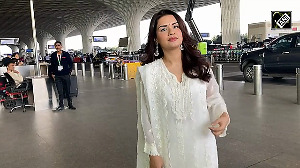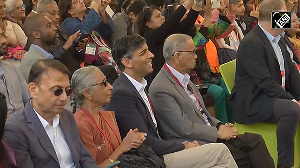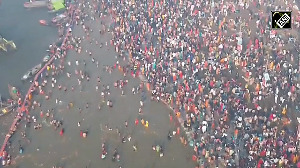"I am, yes."
So began an interview of Pakistan President General Pervez Musharraf, who took time out to speak to ABC's Peter Jennings on the sidelines of the UN General Assembly in New York last night.
Jenning's question was prompted by Musharraf's elaborate security detail as he arrived at CBS headquarters for the interview.
Stressing that he has 'many' enemies, the general said: "But basically it's the extremists. Al Qaeda, certainly, because we want to eliminate them, and I make no bones about it. I have told them that I don't want [them] in Pakistan. But then they have access into our extremist lot, unfortunately, and they equip them and finance them. So, the extremist lot -- a nexus between al Qaeda and our extremists -- they are the main people who are against me."
Al Qaeda taunting me: Musharraf
Musharraf also said the US was not popular among the masses in Pakistan, because the people felt betrayed by Washington. "Until 1990, until we fought the Soviets, we were together, strategically, we were strategic allies. All along, since '47 onwards. Then in 1990, we were abandoned, I think I would use the word abandoned," by the US.
Abandoned? "Yes, with 4 million refugees. Maybe the focus was more West-oriented -- Berlin Wall, and East-West conflict, and Cold War, etc. But then they also got into strategic alliance with India. And not only that, there were sanctions on Pakistan.
"So here was the strategic ally of 50 years, and they are abandoned? They have fought the war, and won the war against the Soviets for you, and they are abandoned? They are put under sanctions? And those who were against you, you are on that side. So what would the public say? I think it was very negative. "
He also believed that the US was ignoring the root causes of terror, poverty and lack of education.
" We are only involved at the moment in fighting terrorism frontally, the military perspective, the immediate response. But we are not addressing the root causes. And I always say the root cause is political disputes, poverty and illiteracy. A sense of deprivation arising out of political disputes, and that sense of deprivation, then taking to extremism and militancy, because people are poor, and illiterate, and they get indoctrinated.
"So I think those root causes are not being addressed, and I hope they are, otherwise we are not going to succeed. We may be winning battles, but we lose the war."
The principal political dispute which needed to be addressed was Palestine, he added.
"Because I think that has the maximum negative perspective all around the Muslim world, whether they are concerned or not. There is unanimous sympathy for the Palestinians against the Israelis. And the United States is seen or perceived as an Israeli supporter and totally against Muslims. So I think this is the one which needs to be resolved immediately. "
While denying that he knew the whereabouts of the Taliban and al Qaeda leadership, he said his government's campaign against terrorism was "very successful. We have operated in south Pakistan, we have busted their sanctuaries from three valleys, so we are very successful. However, there may be more elsewhere. We have a military operation that is continuing."
However, he admitted that terrorist leaders could still be operating out of Pakistan.
"The possibility is there," he told Jennings. "It's a mountainous region, inaccessible. They may be hiding somewhere. But I think if I was to make a guess on which one is safer, I think we are operating militarily in our tribal regions. And we have established this intelligence network, as I said, in all the three dimensions of human intelligence, technological, and aerial surveillance. And also we have been very successful in the cities.
Asked why he was not allowing nuclear scientist A.Q. Kahn to be questioned by Western agencies, he said: "Nobody has asked, number one.
"Number two, we don't want to make him available because we have good interrogators. I mean, it undermines our own capability. We can do it ourselves. And we have done it. We have shared all the information that we have. So not only is it a lack of confidence in our capability, but it also shows mistrust in us. It doesn't make us so happy. "
I faced a dilemma pardoning Khan Musharraf
Asked whether this could be partly because of fears that Khan might reveal Pakistani government complicity in the nuclear blackmarket, he said: "Not at all. Absolutely wrong."
Does Musharraf endorse America's attempts to support democracy worldwide?
" I have very different views on democracy, the understanding and promotion of democracy, and the application of democracy," he said.
"There are no set rules for democracy, first of all. That needs to be understood. Democracy is to be tailored to individual country's requirements, in accordance with the environment in that country. And in all developing countries, the society is so different that you need to apply, if you want to have sustainable democracy, you need to apply it to that particular environment.
Musharraf hints he may remain army chief
"So an over-emphasis on democratic values, democracy as understood in the West is, I think, not very productive at all. Maybe it is sometimes even tends to be counter productive in losing focus on key issues. Key issues being, as I said, resolution of political disputes and also poverty elevation, social sector, social economic development."
He also criticized the United States holding [detainees] without charge at Guantanamo Bay, saying, "I think either they should have been tried, or they should be sent to their respective countries for trial. "
However, " I think these are incidents, they can be forgotten, but there has to be actions which put these behind. I mean, I have always believed that it was the United States that saved Muslims in Bosnia.Then they even helped them reconstruct I mean, this is, but unfortunate that this has all been forgotten by the Muslim world."
So how has all this security affected Musharraf's personal life?
"Well, it has restricted my movements to a degree," the general replied.
"It has restricted my natural behavior pattern because I have always been very much into people. I'm not an introvert. I am an extrovert. I like meeting people. I like moving around.
"Having said that, I haven't become a hermit or anything. I do move around. I do attend marriages. I do go into hotels for some dinner, off and on, with the public, and maybe even at night going to Marriott, and having a cup of coffee, or hot chocolate. I do that very frequently."






 © 2025
© 2025